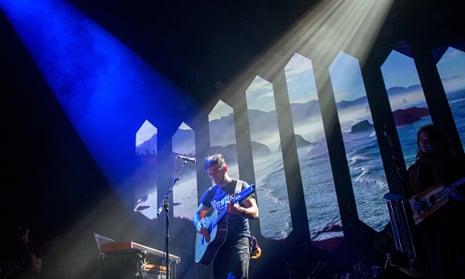“I’m glad to be in a room with so many living, breathing people,” jokes Sufjan Stevens, halfway through his second night at London’s Royal Festival Hall. The previous hour – during which he hasn’t addressed the audience at all – has been concerned with the finality of death, an intensity leavened only by songs about abandonment, substance abuse, suicidal despair and the state of Oregon. “We’re all going to die,” runs the chorus of Fourth of July. The song doesn’t share the Zen equanimity with which the Flaming Lips approached the same subject matter on Do You Realize?? in 2002; it is far more hard-hitting and final.
The first half of tonight’s performance draws largely from Carrie & Lowell – Stevens’s seventh album proper, released last spring, which documented his relationship with his mother. Carrie was unable to raise her children full-time; she died of cancer in 2012. Her official problems were many – bipolar disorder, alcoholism, depression, homelessness. Currently being played in a handful of UK cities, with a headline stop at the End of the Road festival last night - Stevens’s first-ever in the UK – this collection of songs portray a very intimate struggle to reconcile a young son’s visceral, bewildered love for his unavailable mother with the compassion of the adult Stevens, and his desperate fear of repeating her destructive patterns.
The intensity of this run of songs is due in equal parts to their innate bleakness and to Stevens’s extraordinary five-strong band, playing an array of mandolins, ukuleles, pedal steel guitars, electronics and percussion.
They make the very most of the Festival Hall’s pin-sharp acoustics, swelling gradually so that Stevens’s grief seems to ambush you, then offer celestial four-part harmonies as relief. “I still pray to what I cannot see,” sings a spotlit Stevens on Eugene. His band, in darkness, respond with a very distant and spooky “aaaah”.
The focus, though, is always on Stevens, playing guitar or piano before moving to keyboards, often in the course of the same song. His voice, a haunted whisper, swoops elegantly upwards into falsetto within the same breath; vocal effects create a faraway, dreamier delivery. Exquisite lighting illuminates the skilled care with which this devastatingly lovely music is being relayed live.
“I just wanted to be near you,” runs a line from Eugene, a song named after the city in Oregon, where Carrie and Lowell, Stevens’s stepfather, lived in the early 1980s; Stevens would visit.
“Mother, I forgive you,” runs another, from Death With Dignity. These are among the simpler lines to grasp tonight. Stevens has been reluctant in interviews to elucidate whether the closing line of the album’s title track is autobiographical. “She breaks my arm,” it goes.
Tonight, the instruments cast light on that lyric: plucked strings build gently to a climax in which Stevens unleashes a wriggling keyboard solo. People are hugging each other.
More often, though, Stevens’s memories and emotions are tied up in a dense layering of imagery from mythological and biblical sources, and nature. One theme teased out by this performance is the recurring role of the meadowlark. A little Googling reveals it is the state bird of Oregon; Carrie & Lowell was, at one stage, titled Oregon, following the pattern of Stevens’s abandoned 50 States project (he managed Michigan in 2003 and Illinois in 2005).
The meadowlark features in Carrie & Lowell’s lyrics but tonight, there are at least three harmonic exchanges between Stevens and multi-instrumental backing singer Dawn Landes (an Americana artist in her own right) that mimic its song. (Older songs, such as a riveting rendition of The Owl and the Tanager, have it too.)
Soon, you start hearing meadowlarks everywhere – in piano arpeggios, in the warbling solo Steve Moore plays on Futile Devices, fluttering a small portable keyboard back and forth across a microphone.
If the album Carrie & Lowell most closely resembles Stevens’s stripped-back and spiritual Seven Swans (2004), this live version has been put through the prism of The Age of Adz, Stevens’s kaleidoscopic effort of 2010, dense with electronics. The set list’s bookends are atmospheric instrumentals that nod to Stevens’s recent meditative soundtrack for a documentary about rodeos. The only misstep of the night is All of Me Wants All of You, which gains an ugly trip-hop remix.
The second half of tonight’s lengthy set travels around Stevens’s huge discography, with flirty jokes at the expense of Landes on Dress Looks Nice on You. Blue Bucket of Gold finds celebrated composer/arranger Nico Muhly bashing away on the Festival Hall’s vast organ as Landes ululates into a microphone and the band crescendo into yet more magnificently arranged grief.
Death doesn’t go away, but gallows humour creeps in. Stevens tells of growing up with a garden full of rotting pet corpses, thanks to his father and stepmother’s belief in “sky burial”; humans, they believed, were a celestial fungus seeded on to Earth. Death was ever-present: in the funeral home across the road, at birthday celebrations. “This is why I’m so fucked up,” Stevens laughs.

Comments (…)
Sign in or create your Guardian account to join the discussion